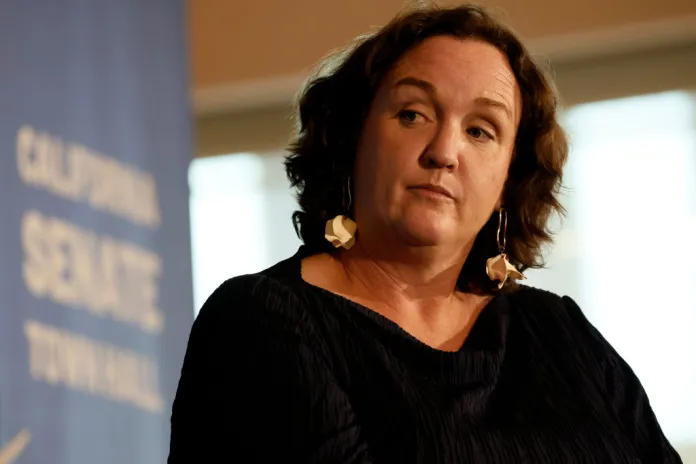“When you’re accustomed to privilege,” people who write for the New York Times like to say, “equality feels like oppression.”
Katie Porter, a former Democratic California representative and media darling, learned that when you’re accustomed to coddling, journalism feels like persecution.
Porter imploded in an October interview with a CBS News reporter. The moment went as viral on the internet as her famed “smackdowns” of corporate executives and Republican officials.
If you made it through the three-minute video, you might think you watched the end of her career, which was taking off until she gave up her House seat for a failed Senate race in 2024.
What pushed Porter over the edge? What made this tough, no-nonsense, tells-it-like-is progressive hero declare she would quit the interview? In her own words, the answer was the “follow-up questions.”
“I have never had to do this before,” she said.
How could a seasoned politician — a three-term congresswoman in her second state-wide race — find a follow-up question to be some sort of aggression?
That’s what happens when you spend your public career as a favorite of the elite class, which includes the press.

Porter was an academic, a liberal who left Iowa for California. She enjoyed cursing and fit into Washington, D.C., so well in many ways, but could complain about this town with a feminist edge. For the average political reporter in the district, Porter was one of us.
And it showed. Look at the inside-the-Beltway coverage of Porter when she was in the House, and you can see how she got accustomed to the sort of “pleasant, positive conversation” and “happy experience” she expected from the CBS reporter.
“How does Katie Porter Do It?” said one Washington Post headline above an article that gushed, “Rep. Katie Porter (D-Calif.) has a well-earned reputation for slicing and dicing administration witnesses who lack knowledge of their departments or agencies.”
A 2019 news article at the outlet described her as “the newest threat to Wall Street,” and characterized her haranguing of witnesses as “intellectual.” (In her 2020 and 2022 narrow reelections, she raised much more from the securities and investment industry than did her Republican opponents.)
In 2023, when Porter decided to run for the Senate, NBC News ran a profile on her and her new book. It was all softballs. Reporter Natalie Morales asked her how hard it was to be in Congress and showed her pointing out the mess in her minivan.
“When you’re in this minivan, do you ever rock out?” Morales asked. “A little carpool karaoke?”
Morales’s most challenging question was about her chief Democratic rival for that Senate seat: “Are you more of a warrior than Congressman Schiff is?”
The segment ended with NBC hostess Gayle King saying, “You go, Katie Porter,” and Morales replying, “She tells it like it is. She’s pretty real.”
Whenever a Democrat had a criticism of Porter, they seemed to feel the need to apologize for it.
After Porter left her House seat for the 2024 Senate race, leaving Democrats vulnerable to a possible GOP takeover, then lost to Schiff, and finally declared the election “rigged,” local Democrats still pulled their punches: “I’m reluctant to criticize a woman for having aspirations, because we want to inspire, lift up and push up more women into leadership positions,” Katrina Foley, a Democrat on the Orange County Board of Supervisors, told the New York Times (in a story that left out Porter’s charges of a “rigged” election).
Given her clear intelligence and supposed love of tough questioning, the CBS interview was even more bizarre.
Porter began the interview by laughing off a question that all her rivals had answered: how she would win over the 40% of Californians who voted for President Donald Trump.
Porter, who rose to fame on the back of combative, on-camera, made-for-social-media fights with sorry-looking old white men, clearly shifted into smackdown mode. She leaned in, “How would I need them in order to win, ma’am?” she asked, with the sarcastic “ma’am.” Then Porter turned to another camera and laughed, knowingly.
Porter believed this was yet another home game for her, and that the audience would clap like seals as her social-media boosters always did when she went head-to-head.
But instead of being defensive, CBS reporter Julie Watts persisted and pressed her question. Porter responded with talking points, and Watts suggested that those talking points contradicted Porter’s totally confident initial answer.
At this slightest push — a request for her to reconcile two conflicting statements she made about 45 seconds apart — the famously argumentative congresswoman declared, “I feel like this is unnecessarily argumentative.”
Then Porter decided to end the interview: “I don’t want to keep doing this. I’m going to call it.” Porter said she wouldn’t do the interview with “seven follow-ups to every question you ask.”
There were not seven follow-ups. There was one question, which Porter first refused to answer, then answered with a talking point that contradicted her reason for rejecting it in the first place. Then she had a temper tantrum and explained, “I want to have a pleasant, positive conversation.”
One could just imagine the Wall Street banker, the pharmaceutical CEO, or the Republican official thinking exactly that while facing Porter’s questions. One could never imagine one of these Porter victims having the self-regard to actually say that.
Something convinced Porter that she deserved to be treated delicately. It was probably the Beltway media. They did her a disservice.
